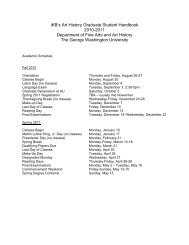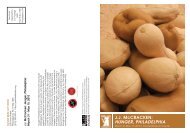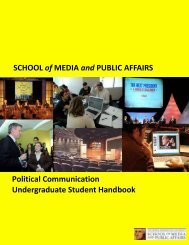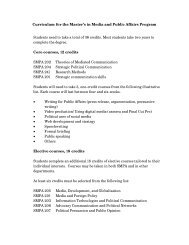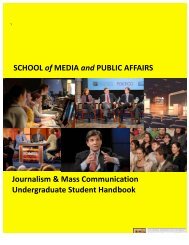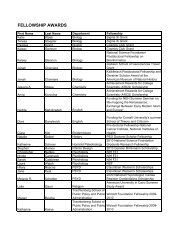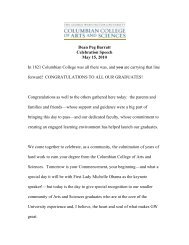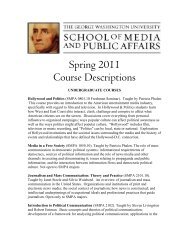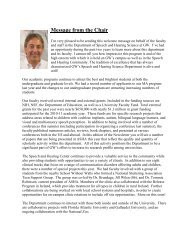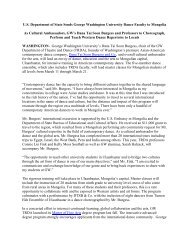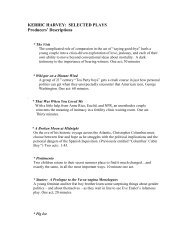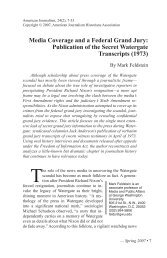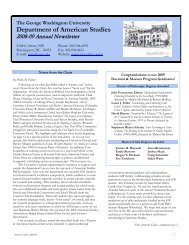Autism Forensic Science Immigration Trends Teaching Recipe for ...
Autism Forensic Science Immigration Trends Teaching Recipe for ...
Autism Forensic Science Immigration Trends Teaching Recipe for ...
You also want an ePaper? Increase the reach of your titles
YUMPU automatically turns print PDFs into web optimized ePapers that Google loves.
A chAnge oF course<br />
Maltin came to Columbian College to study<br />
physics. She aspired to being an astronaut, but<br />
her freshman class with carl Stern, now an<br />
emeritus professor of media and public affairs,<br />
set her on a new path.<br />
“I took media law as one of my Columbian<br />
College requirements. After our midterm exam,<br />
Professor Stern wrote ‘SEE ME’ on my exam<br />
and, of course, I assumed the worst. But when<br />
I met with him he said I had a talent <strong>for</strong><br />
media writing and convinced me to take a few<br />
more classes. I got hooked and switched my<br />
major to journalism. …Without Professor<br />
Stern’s suggestion, my life may have taken a<br />
totally different course.”<br />
A knack <strong>for</strong> journalism wasn’t the only surprise<br />
Maltin discovered at GW. Be<strong>for</strong>e her senior<br />
year, she was diagnosed with Celiac Disease, an<br />
autoimmune ailment that attacks the small<br />
intestine and prevents absorption of nutrients<br />
from food. “It was a huge wake-up call <strong>for</strong> me,”<br />
said Maltin, who suffered from migraines and<br />
stomach problems be<strong>for</strong>e bringing her illness<br />
under control.<br />
“It turns out that all of my problems were<br />
caused by the food I was eating,” she explained.<br />
“The disease is triggered by eating gluten, the<br />
protein found in wheat, rye, and barley. So,<br />
eating breads, pizza, pasta, cookies, cakes,<br />
waffles…anything with those ingredients, was<br />
causing a toxic reaction in my body.”<br />
“My professors made a point of reminding<br />
us to give back to our community,” said Maltin.<br />
“They all gave back every day by helping their<br />
students advance in their lives and careers.”<br />
Within about six weeks of starting a gluten-free diet, Maltin was healthy. “I just<br />
couldn’t believe how much food could affect my life,” she said.<br />
The diagnosis set her in a direction that would become her career and passion.<br />
After graduating from GW, Maltin entered the Institute of Culinary Education,<br />
broadening her knowledge of nutrition and food allergies in the culinary<br />
profession. She also experimented with substituting gluten-free options <strong>for</strong> some<br />
of her favorite recipes.<br />
“I have loved cooking as long as I can remember,” said Maltin. “As a little girl, I<br />
helped my grandmother churn butter, pick corn and tomatoes in the fields, and<br />
make pies. I sought my degree in culinary arts to combine my love <strong>for</strong> food and<br />
writing into a career.”<br />
In addition to her recent book, Maltin penned Beyond Rice Cakes: A Young Person’s<br />
Guide to Cooking, Eating & Living Gluten-Free. “I wanted to write a cookbook<br />
and lifestyle guide that was easy to use, took advantage of fresh, healthy, and<br />
high-quality ingredients, and made people feel normal,” said Maltin. “The recipes<br />
are easy to make, not terribly time consuming, and consist of my favorite foods<br />
that I can’t typically get made gluten-free at restaurants, such as Italian, Asian,<br />
and Mexican.”<br />
The availability of gluten-free food and beverage products has increased<br />
dramatically in recent years, and many grocery stores now have gluten-free<br />
sections. Maltin attributes the increase to the 2004 decision by the National<br />
Institutes of Health (NIH) to reclassify the ailment as a “common disease.” NIH has<br />
since launched a major awareness campaign to educate doctors and the public.<br />
Maltin’s volunteer work with the Celiac Disease Program reflects not only her<br />
commitment to helping others cope with the disease, it also embodies another<br />
lesson she learned during her years at GW.<br />
“My professors made a point of reminding us to give back to our community,”<br />
said Maltin. “They all gave back every day by helping their students advance in<br />
their lives and careers.”<br />
columbian college of arts and sciences alumni page 29



